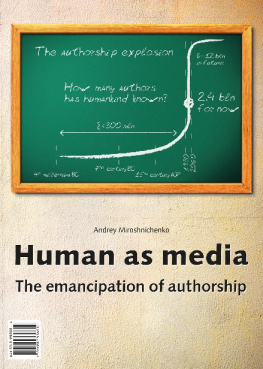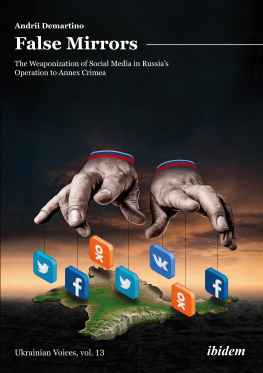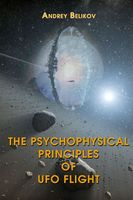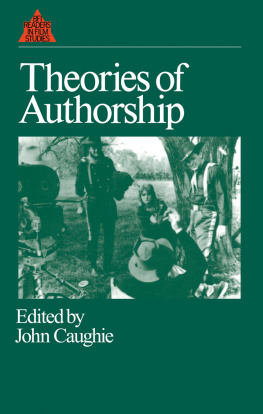Human as media.
The emancipation of authorship
By Andrey Miroshnichenko
Text copyright 2014 Andrey A. Miroshnichenko
All Rights Reserved
Moscow, 2014
ISBN 978-5-9905368-1-4
Table of Contents
Introduction. Weve got radio, but not happiness
So weve got radio already, but were still waiting for happiness, said Soviet satirist Ilya Ilf
The changes taking place today are bound to the Internet. The abundance of technological novelties enthralls and distracts people from more fundamental concerns: what is happening right now to individual and society?
Technological changes are quite easy to describe and even predict. Human nature is a more complicated matter.
Tradition lies at the centre of any humanities-oriented philosophy, which focuses more on the past. There is an avant-garde movement in the humanities, but it is always marginal. Those ideas and creations that have stood the test of time and have amassed a history of human response are the ones that are most highly valued. Academics in the humanities are paid for tradition. On the other hand, at the focus of the technocratic approach is innovation, because the technological sphere is aimed at the monetisation of the new, rather than of tradition.
As a result, it is primarily technocrats who are occupied with preparations for tomorrow. Meanwhile, proponents of the humanities usually apply their talents to what has already happened, that is, to the present moment, thanks to which it becomes familiar, that is, the past.
There is a certain logic to this temporal allocation of competencies. Technocrats move human technical abilities forward, while proponents of the humanities maintain social cohesion, transforming the new into habit.
This balancing mechanism of the new and the old worked very well when time was not running so fast. In the old days, a single political, economic or technological era stretched over tens and even hundreds of generations. Technocrats were not very productive and proponents of the humanities were able to cope with the pace of innovation.
***
The demographic transition of the 20 th century was marked by the appearance of a new social phenomenon: the pivotal generation . The pivotal generation was the first generation whose life lasted longer than an era. It was a generation of people who for the first time in history found themselves living through two or even more eras within their single human lifetime.
In Russia, the pivotal generation consisted of those born in the 1930s and 1940s. They were raised in the agrarian era, they worked through the industrial era, and now many of them are dabbling in the post-industrial era. Three eras in one generation for the first time in the entire history of the planet.
In countries that are experiencing a demographic transition later than Russia, the lives of this pivotal generation may incorporate even more eras: from feudal societies to mobile Internet and the sharing economy.
In countries that have already lived through the pivotal generation, the compression of historical time leads to constant temporal stress. Temporal stress is a phenomenon in which a habit is unable to keep up with innovation. If an era is shorter than a generation, the balance between the speed of technical innovation and the speed of cultural adaptation breaks down. This is the reason why everything is amazing right now, and nobody is happy.
***
Technocrats are able to cope with this speed. They are good at what they do: innovation. For them, the compression of time is a celebration of accelerated monetisation. Never before in history have there been as many young first-generation millionaires and billionaires as there are today.
And thus the lag in the humanities and the liberal arts may lead to societys losing cohesion and the ability to understand itself. At the moment of writing, because of the speed of change, the concepts contained in the humanities are becoming a matter for historical review.
At the same time, common people are, for the first time ever, assimilating the change of era personally, even sensually, through changes in their tactile skills. For example, modern human is already trying out 3D manipulation, but still remembers how to leaf through a book. And between these skills, there are operations with the TV remote, the keyboard and mouse, and the touchpad. These interfaces are so distinct that they could be used to name discrete eras. The TV remote or the mouse themselves represent eras, only not historical eras, but technological ones. Historically they have been compressed incredibly tightly within a single human lifetime.
This compression is continuing. Imagine an era that lasts just a year. Or a month. Everything is changing so quickly that people find themselves in an unfamiliar world. What Toffler ).
This may explain the increase in social aggression and the new barbarism. If progress gives rise to constant stress, the logical defence response becomes reactionism, which significantly resembles regression and a recoil to medieval values. Meanwhile, the exaggerated defence of traditionalistic norms is motivated not so much by their real value to their supporters, as by a desire to resist the image of the enemy. The image of the enemy, for its part, demands embodiment, and gets it in the form of the most technologically advanced cultures the leaders of global innovation.
***
Contemporary barbarism does not predate civilisation, but accompanies it. Extremism is motivated not by poverty, but by a feeling of injury and loss.
The growth in extremism and terrorism is the flip side of ICT (information and communications technology) development. This is the other price that humankind pays for successful Silicon Valley startups. But these troubles do not concern technocrats, because they cannot and should not see the connection between these two phenomena.
Reactionism is particularly strong in societies where tradition has always been a more important regulator than adaptation.
Before the era of mass connectivity, each nation was left to simmer in its own juices, and saw itself as the centre of the world. For traditionalistic societies, being closed was quite naturally a condition of psychological comfort. Television and the Internet connected everyone. Everyone saw the Other. The comparisons gushed out, often painful ones. Rejection was an inevitable consequence of this. If it suddenly becomes clear that the Universe does not revolve around my planet, the best way to return to a sweet and comfortable form of geo-centrism is to burn Giordano Bruno.
The Other shatters the monopoly of Our Own, and is therefore seen as an insult, aggression, an invasion. Despite how paradoxical this seems, openness of information in closed societies leads to a surge in xenophobia. These are the consequences of the acceleration of ICT development.
Using computer terminology, the Russian academic Sergei Kapitsa said that the software of humankind cannot keep pace with the technology, the hardware, of civilization.
Proponents of the humanities also instinctively reinforce the opposition to innovation and technocrats. Concepts such as humanities advocacy emerge, which defend the tradition of the humanities against the technocratic mainstream instead of providing the technocratic mainstream with the tradition of the humanities.
Rejection as a reaction is understandable, and potentially useful. But it is not possible to slow down the compression of time this is a dead-end strategy. It leaves technological changes without social software.
Perhaps it is even more important for proponents of the humanities not to stand up to technocrats, but to unite with them, with all our diffusion of formulations, our dislike for precise evidence and our tendency to replace strict concepts with blurred images.










